Can Elderly People With Autism Need Home Care?
Supporting Aging Autistic Adults: The Importance of Personalized Care

Understanding the Needs of Elderly Individuals with Autism
As the understanding of autism expands across the lifespan, recognizing the unique challenges faced by elderly adults with autism becomes increasingly important. Aging individuals with autism require specialized, ongoing support that adapts to their changing needs. This article explores the specific needs, challenges, available services, and the vital role of home care in ensuring quality of life for elderly autistics.
The Lifelong Nature of Autism and Its Implications for Aging
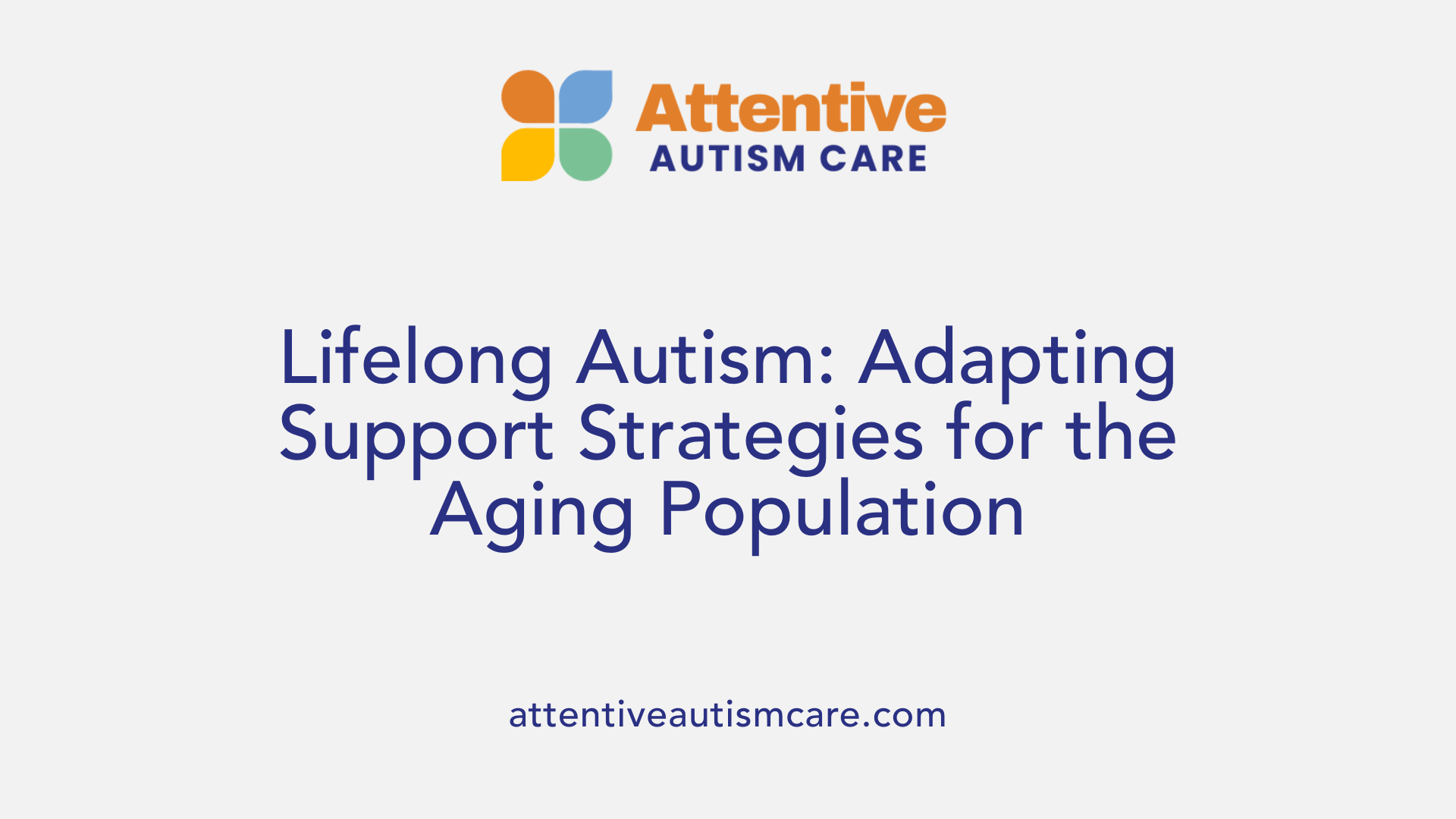
What are the specific needs of elderly individuals with autism?
Autistic individuals require continuous, personalized support throughout their lives, and these needs often evolve as they age. In older adults, support must specifically target communication difficulties, sensory sensitivities, and social interaction challenges.
Creating a safe, structured environment is crucial. Routine helps manage anxiety and provides predictability in daily activities. Modifying living spaces and routines enables seniors with autism to maintain independence and reduce stress.
Support from family members, community programs, and trained professionals—including behavior analysts—plays an essential role. These supports foster social engagement, help manage health issues, and promote overall well-being.
Sensory sensitivities like bright lights, loud noises, or strong smells can become more pronounced. Caregivers should make environmental adjustments and introduce gradual social interactions to prevent overload.
Additional services are vital, such as specialized housing options, healthcare adapted for aging and autism, and end-of-life planning. These measures ensure a comprehensive approach to meet the complex needs of elderly autistic individuals.
Providing ongoing, tailored support not only enhances quality of life but also promotes safety, health, and dignity in the later years. As awareness increases, integrating these needs into healthcare and social services is essential for supporting aging individuals with autism.
Understanding the Challenges Faced by Elderly Autistic Adults
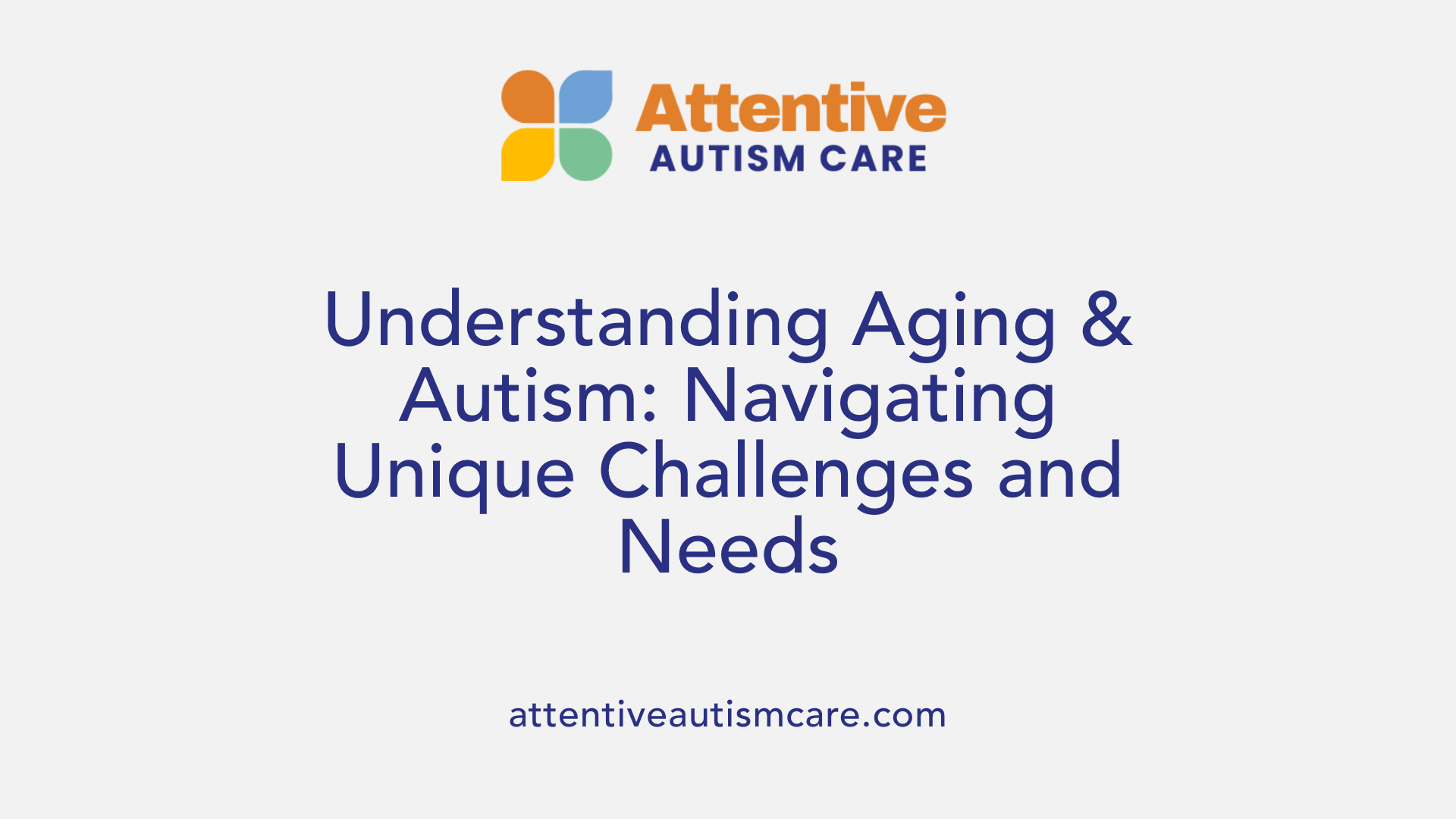
What challenges do elderly people with autism face?
As individuals with autism age, they encounter a variety of unique challenges that affect their health, well-being, and daily life. Chronic health issues such as gastrointestinal problems, sleep disturbances, seizures, and sensory sensitivities tend to become more pronounced over time. These health concerns can significantly impact their overall quality of life.
Social isolation is another pressing issue. Many elderly autistic adults struggle to maintain support networks due to difficulties in social interactions and communication. This often leads to feelings of loneliness and distrust, particularly when they are placed in unfamiliar or stressful settings like hospitals or new care environments.
Cognitive decline, including memory challenges and slower processing speeds, pose additional hurdles. They are at a heightened risk of developing neurological conditions such as dementia and Parkinson’s disease. Recognizing and addressing these risks early is crucial for effective management.
Furthermore, communicating health needs can prove difficult for many elderly autistic adults. They might not effectively express discomfort or pain, and declining senses—like reduced hearing or vision—can go unnoticed, delaying necessary interventions. These communication barriers complicate medical visits and daily support.
Housing, healthcare, and social integration require tailored support strategies. Age-related physical health problems, coupled with autism’s challenges, make comprehensive, individualized care essential. Providing suitable environments and trained caregiving support can greatly improve outcomes, helping elderly autistic adults maintain independence and dignity.
This combination of health concerns, social risks, and communication barriers underscores the importance of recognizing and addressing the specific needs of aging individuals with autism to ensure they receive respectful and effective care.
Available Support Options and Services for Elderly Autistic Adults
What support options and services are available for elderly people with autism?
Elderly individuals with autism can benefit from a variety of specialized healthcare and home care services tailored to their unique needs. These services typically include assistance with daily activities such as personal hygiene, meal preparation, and medication management. Having qualified caregivers familiar with autism ensures that support is personalized and effective.
Creating supportive living environments is crucial. This involves adapting homes to meet sensory sensitivities—such as managing bright lights, loud noises, and strong smells—and establishing clear, predictable routines to reduce anxiety.
Visual supports, like schedules or memory aids, help reinforce routines and promote independence. Personalized approaches that consider individual preferences and sensitivities enable seniors to live more comfortably and with dignity.
Engagement in meaningful activities, hobbies, and social events can significantly enhance quality of life. Programs that focus on social skills, occupational therapy, or leisure pursuits offer additional benefits, fostering a sense of purpose and connection.
Various organizations, including the Autism Society, Easterseals, and the Organization for Autism Research, provide valuable resources and guidance. These groups advocate for better services and support tailored specifically for aging adults on the autism spectrum.
While research specific to aging populations with autism continues to grow, available services aim to address the core issues of health management, social isolation, and behavioral challenges. With access to targeted support and adaptive environments, seniors with autism can enjoy greater independence and improved well-being.
Effective Care Strategies for Aging Individuals with Autism
What are effective care strategies for supporting aging individuals with autism?
Supporting older adults with autism involves a thoughtful and comprehensive approach that considers their unique physical, emotional, and social needs. Tailoring care plans through interdisciplinary teams—including healthcare providers, therapists, and support workers—is vital.
Environmental modifications are a cornerstone of effective care. Creating sensory-friendly spaces and adjusting routines help reduce anxiety and stress, providing familiarity and predictability. For example, using visual supports such as schedules or social stories can guide daily activities and ease transitions.
Regular assessments by specialists ensure that interventions are current and suited to the individual’s changing health status. Caregivers and staff need training in behavior management, communication techniques, and understanding sensory sensitivities. Skilled support personnel can assist with daily tasks, medication management, and fostering social engagement.
In addition, promoting community involvement and social activities can combat loneliness and encourage independence. Ensuring access to healthcare services, including therapies like speech, occupational, and behavioral therapy, enhances overall well-being.
Collaboration among healthcare providers, families, and support networks creates a safety net that adapts as needs evolve with age. This coordinated effort guarantees a respectful, supportive environment where aging adults with autism can maintain dignity, independence, and a higher quality of life.
Summary Table:
| Strategy | Focus Area | Details |
|---|---|---|
| Environmental adaptations | Comfort & predictability | Sensory-friendly spaces, visual supports, routine adjustments |
| Interdisciplinary assessment | Ongoing care | Regular reviews by healthcare and neurodevelopmental experts |
| Caregiver training | Support skills | Behavior management, communication, recognizing distress |
| Social & community inclusion | Well-being | Social activities, support groups, healthcare access |
| Coordination with professionals | Comprehensive care | Developing tailored plans, managing health issues |
The Role of Home Care in Supporting Elderly Adults with Autism
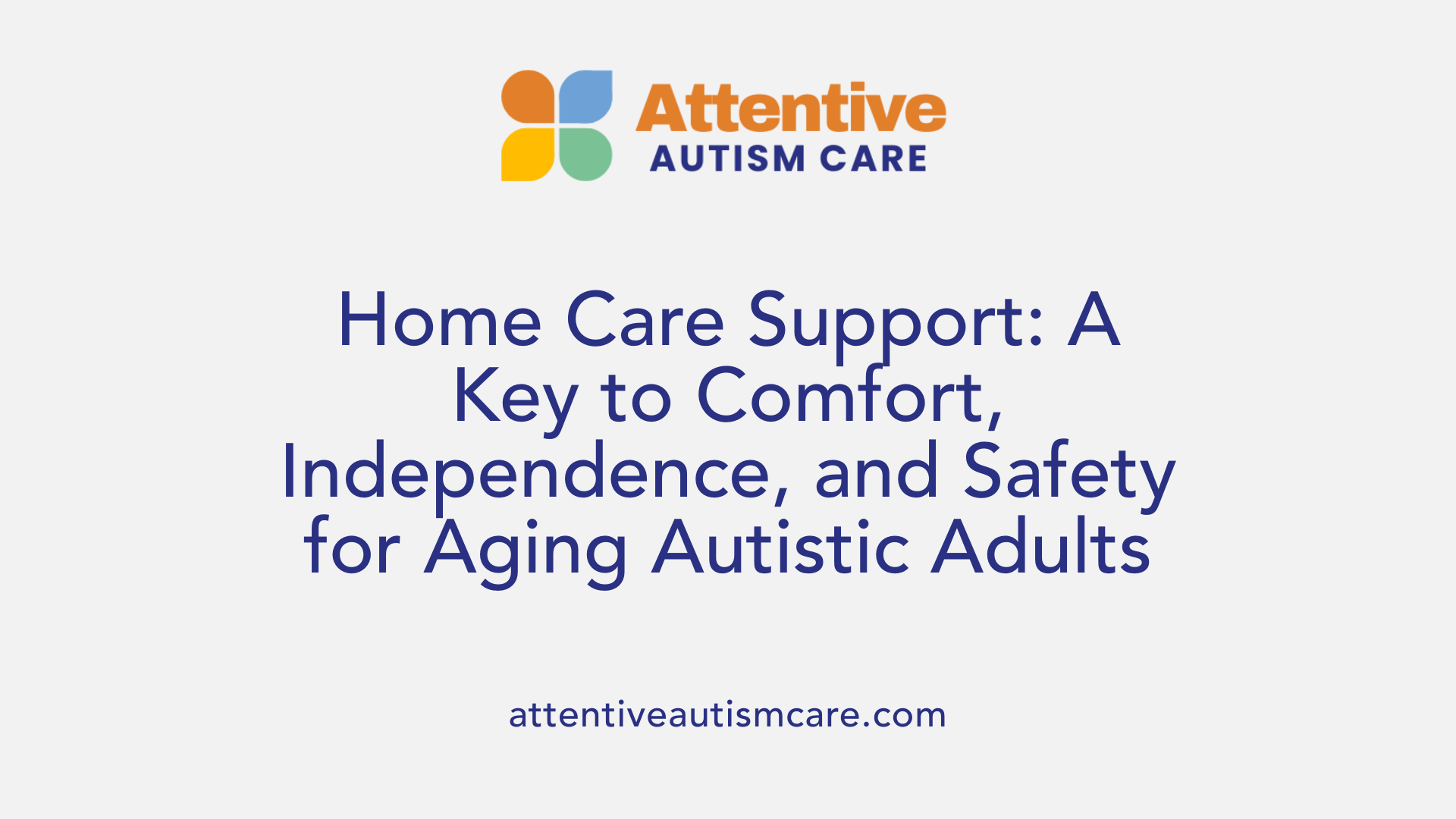
Do elderly people with autism require home care?
Many older adults with autism benefit significantly from home care services. These services are designed to offer personalized support tailored to the unique sensory, communication, and behavioral needs of each individual. Home care can assist with daily activities such as personal hygiene, meal preparation, and medication management, helping maintain routine and independence.
Creating a stable environment through familiar settings is particularly beneficial for elderly autistic individuals. Sensory-friendly spaces, routines, and predictable schedules help reduce stress and sensory overload. Caregivers trained in autism-specific approaches can recognize signs of discomfort or distress and respond appropriately, ensuring the person's safety and comfort.
Support groups and social programs also play a role in reducing feelings of isolation and encouraging social engagement. Developing comprehensive, long-term care plans that include caregiver training helps improve quality of life and adapt to age-related changes. In summary, specialized home care is often essential for supporting the well-being and independence of elderly adults with autism.
Benefits of home care: familiarity, sensory management, personalized support
Home care offers a familiar and secure environment that can significantly improve quality of life for older adults with autism. The comfort of remaining in a known setting reduces anxiety and helps them manage daily routines more effectively.
Sensory sensitivities—such as loud noises, bright lights, or strong smells—are common in autistic individuals. Home care professionals can implement adjustments like noise reduction, lighting controls, or calming routines to prevent overstimulation.
Personalized support is another core benefit. Care plans tailored to individual preferences, sensitivities, and abilities ensure that each person receives appropriate assistance, fostering independence and reducing behavioral challenges.
Types of home care services
Several specific services cater to the needs of elderly adults with autism:
| Service Type | Description | Benefits |
|---|---|---|
| In-home care | Assistance with daily activities, medication, and personal hygiene | Maintains comfort of familiar surroundings, promotes independence |
| Respite care | Temporary relief for family caregivers | Prevents burnout, ensures continuous quality care |
| Autism-specific services | Behavioral therapy, speech and language therapy, occupational therapy | Addresses communication and behavioral needs |
| Social support | Companion services and family training | Enhances social skills and caregiver knowledge |
Long-term planning and caregiver training
Effective long-term support begins with detailed planning. This includes understanding the individual's evolving needs and adjusting care strategies accordingly.
Caregiver training is crucial. Educating caregivers about autism in the elderly, recognizing behavioral cues, and implementing effective communication techniques improve care outcomes.
Collaborating with healthcare professionals helps develop comprehensive care plans, manage co-occurring health issues, and ensure ongoing assessments.
Providing consistent, specialized support through trained caregivers and adaptable services allows elderly individuals with autism to achieve the best possible quality of life while maintaining independence.
Maximizing Quality of Life Through Tailored Support and Environment Modification
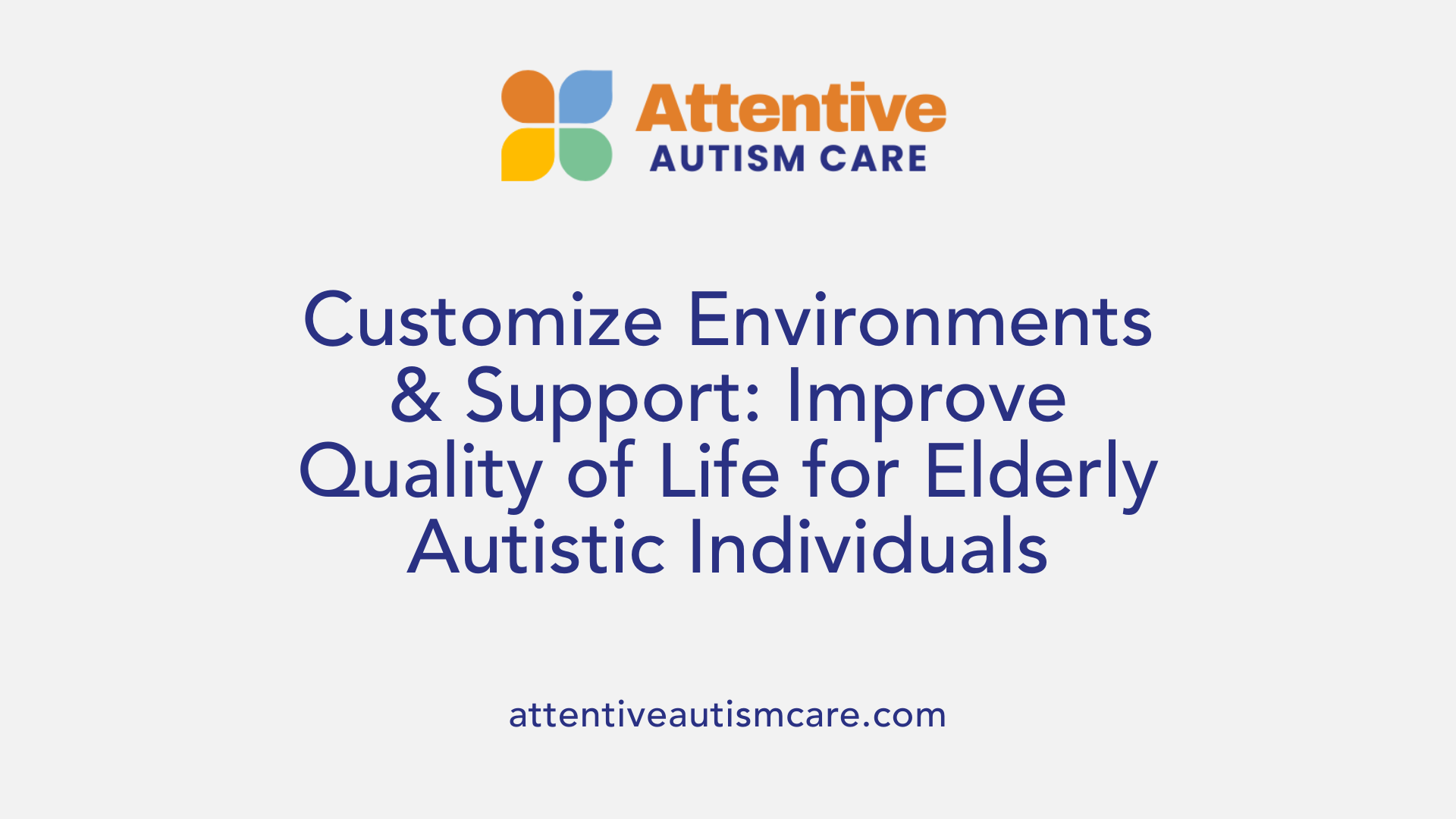
How can support be optimized for elderly individuals with autism?
Support for elderly individuals with autism can be greatly enhanced through personalized care strategies. Since each person has unique needs, routines, and sensitivities, developing individualized plans ensures that care is relevant and effective. Implementing environmental adjustments, such as creating sensory-friendly spaces with soft lighting and minimal noise, helps reduce overstimulation. Visual supports like pictograms and clear schedules offer predictability, which is vital for managing anxiety and confusion.
Engaging in activities that match their interests helps maintain social and mental stimulation, fostering a sense of purpose and connection.
Importantly, community and family involvement play a pivotal role. When loved ones and support networks understand the person’s specific needs, they can advocate for appropriate services and resources. Regularly reviewing and updating care strategies ensures they adapt to the aging process, addressing emerging health issues or behavioral changes.
Collaboration with healthcare providers, caregivers, and support systems creates a comprehensive environment that promotes independence and emotional well-being. Tailoring support in this way helps elderly autistic adults live more comfortably and with dignity, enhancing their overall quality of life.
Conclusion: The Critical Role of Personalized Home Care in Aging Autistic Adults
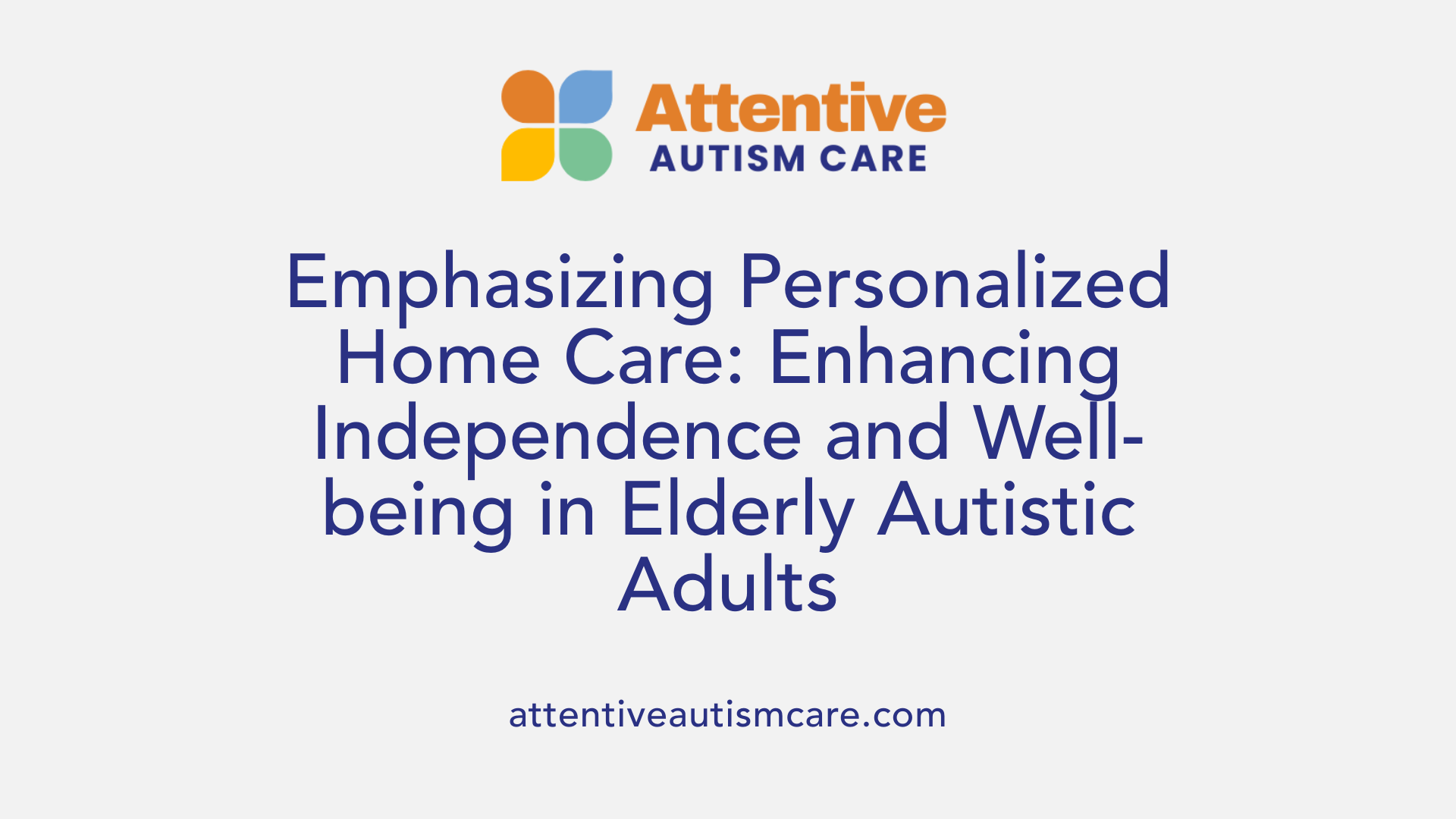 As individuals with autism get older, their support needs can become more complex, often involving increased difficulties in communication, social interaction, and managing daily routines. These challenges can be further compounded by health issues and age-related changes, making tailored home care services an essential part of maintaining their quality of life.
As individuals with autism get older, their support needs can become more complex, often involving increased difficulties in communication, social interaction, and managing daily routines. These challenges can be further compounded by health issues and age-related changes, making tailored home care services an essential part of maintaining their quality of life.
Providing support within the comfort of their own homes allows elderly autistic adults to live more independently and comfortably. Customized services such as assistance with personal care, medication management, and routine activities help address their specific sensory sensitivities and behavioral needs. Creating predictable routines and sensory-friendly environments can significantly reduce stress and improve overall well-being.
The benefits of personalized home-based care extend beyond practical support. They foster a sense of safety and security, which is particularly important for those with autism who may be sensitive to stimuli like bright lights or loud noises. Engaging with support groups and community resources further enhances social connections and offers emotional support for both caregivers and individuals.
A trained caregiver workforce is vital. Education in autism-specific strategies ensures caregivers can recognize behavioral cues, manage behavioral challenges, and develop effective communication methods, tailored to the individual's preferences and sensitivities. Long-term planning involving healthcare professionals guides appropriate interventions, addresses co-occurring health issues, and supports the individual's evolving needs.
Ultimately, comprehensive, customized home care provides a foundation for improving life quality for elderly adults with autism. It helps them navigate age-related changes, supports their independence, and promotes well-being, emphasizing the importance of ongoing, personalized support services throughout their lifespan.
Ensuring Quality of Life for Autistic Seniors Through Tailored Support
In conclusion, as the population of elderly individuals with autism grows, it becomes clear that personalized, consistent, and compassionate home care plays a vital role. Such care not only addresses the complex sensory, behavioral, and health needs but also emphasizes maintaining independence and enhancing well-being. Training caregivers, adapting environments, and engaging community resources are key components. Recognizing the necessity of tailored support ensures that aging autistics can enjoy a meaningful, fulfilling life in the comfort of familiar surroundings while receiving the necessary assistance to meet their evolving needs.
References
- Can Elderly People with Autism Need Home Care? - Astra ABA
- Can Elderly People With Autism Need Home Care?
- Home Support Services for Adults with Autism - Integrity, Inc.
- Caring for Older People with Autism - CareHop
- 12 Tips for Caring for Seniors with Autism - ConsidraCare
- Can Elderly People with Autism Need Home Care? - Astra ABA
- Can Elderly People With Autism Need Home Care?




































































































